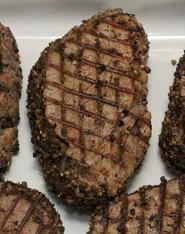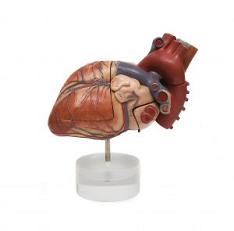L-Carnitine Benefits and How l-Carnitine Works
| Share on Facebook | Share on Twitter | Share on Google+ |
Carnitine is not an "essential" amino acid because the human body can make it from other amino acids found in food. Carnitine is so valuable to muscle health, however, that health professionals recommend supplemental carnitine for bodybuilding, weight loss, and heart health, especially for people who do not eat much (or any) meat in their diets.
 The venerable Physician's Desk Reference (PDR) recommends carnitine supplements for "improving tolerance of ischemic heart disease, myocardial insufficiencies, and hyperlipoproteinemia," in other words, for hardening of the arteries, weakened heart muscle after infection or heart attack, and high cholesterol. The PDR also notes that carnitine deficiency is found in "abnormal liver function, renal dialysis patients, and moderate to severe muscle wasting" caused by anorexia.
The venerable Physician's Desk Reference (PDR) recommends carnitine supplements for "improving tolerance of ischemic heart disease, myocardial insufficiencies, and hyperlipoproteinemia," in other words, for hardening of the arteries, weakened heart muscle after infection or heart attack, and high cholesterol. The PDR also notes that carnitine deficiency is found in "abnormal liver function, renal dialysis patients, and moderate to severe muscle wasting" caused by anorexia.
Even mainstream medicine recognizes the value of carnitine in nutritional supplementation. But what is carnitine.
What Is L-Carnitine?
Chemically speaking, there is no question that carnitine is an amino acid. It is a chemical combination of two essential amino acids, lysine and methionine. When it was discovered, it was first recognized as a required growth factor for yellow mealworms, and it was given the name Vitamin Bt (that's not a typo). Mealworms can't make their own carnitine, but people can, so in humans carnitine is not "vital" in the diet and is not a "vitamin".
Carnitine in its crystalline form exists as two entantiomers. Carnitine joins the "acid" parts of lysine and methionine around a central nitrogen atom. These branches of the molecules can be connected so that crystalline carnitine reflects polarized light to the left (L-carnitine) or the right (D-carnitine). In most chemical reactions this does not make a difference, but the body also has other L- and D- entantiomers of other important chemicals. Only L-carnitine interacts with these chemicals in the body. D-carnitine is biologically inert.
But since only L-carnitine occurs in biological systems, the L- can be assumed when we are discussing carnitine's role in human and animal health. The terms carnitine and L-carnitine are used interchangeably in discussions of nutrition.
There is a compound called DL-carnitine on the market, made by a cheaper manufacturing process that does not separate the inactive D- isomer from the biologically L-isomer of carnitine. This mixture of useless and useful isomers of carnitine may not be, as some commentators suggest, toxic, but it's not the kind of carnitine that really does the body any good.
L-Carnitine Dietary Sources
 L-carnitine is abundant, as its name suggests, in meat, especially in muscle meats such as certain cuts of beef, lamb, and pork. As you can see in the table below, not all "protein foods" are good sources of L-carnitine.
L-carnitine is abundant, as its name suggests, in meat, especially in muscle meats such as certain cuts of beef, lamb, and pork. As you can see in the table below, not all "protein foods" are good sources of L-carnitine.
| Food | Mg of L-Carnitine in 100 g Serving |
| Asparagus | 0,1 |
| Avocado | 2 |
| Bacon | 23,3 |
| Cheese (American) | 3,7 |
| Cheese (Cottage) | 1,1 |
| Chicken Breast | 4 |
| Cod | 5,6 |
| Hamburger Meat | 95 |
| Macaroni | 0,1 |
| Pork | 27,7 |
| Salmon | 8 |
| Tempeh | 19,5 |
| White Bread | 0,1 |
| Whole Milk | 3,3 |
| Horse (The next two entries are not recommendations, only comparisons.) | 185 |
| Kangaroo | 310 |
People who eat both plant- and animal-derived foods typically get 100 to 180 mg of L-carnitine daily from diet. People who eat vegan or vegetarian diets typically get 8 to 18 mg of L-carnitine daily fron diets. About 80% of the carnitine in food is actually absorbed into the bloodstream. Vegan and vegetarian diets do not cause L-carnitine deficiencies if they provide enough lysine and methionine, lysine from beans, peas, and whole grains, and methionine from nuts and seeds.
Freezing or cooking food usually does not change its L-carnitine content. Horse meat and game meats tend to have very high levels of L-carnitine because horses and wild animals greatly depend on muscle strength to survive.
What Does L-Carnitine Do in the Human Body?
L-carnitine is essential for transporting fatty acids to the mitochondria of cells that can use them for fuel. Burning long-chain fatty acids absolutely depends on the presence of L-carnitine.
Long-chain fatty acids are found in the "fat that fills you up" by activating a hormone called cholecystokinin in the digestive tract. This is the hormone activated by "comfort food." Foods that contain these omega-9 long-chain fatty acids include olive oil, peanuts and peanut oil, and cheese. L-carnitine helps the body burn the fat in these foods rather than storing it.
L-carnitine also helps the body use amino acids as fuel. Typically, the body burns sugar or fat to make energy. When sugar or fat are not available, however, the muscles can use the branched-chain amino acids leucine, isoleucine, and valine in place of their usual energy sources. The body uses carnitine along with B vitamins to make the complex of enzymes that "burn" these amino acids for fuel.
Are All L-Carnitine Supplements the Same?
The good news about L-carnitine and N-acetyl-carnitine supplements is that product testing shows that essentially all brands manufactured in North America, Australia, New Zealand, and Europe contain exactly what they list on the label. The only carnitine supplement you would want to avoid is "DL-carnitine," but it's almost impossible to find (and that's a good thing).
Different chemical formulations of L-carnitine have different uses:
N-acetyl-L-carnitine, also known as N-acetyl-carnitine, is a form of carnitine that cells can use more readily than L-carnitine. Here are the reasons why.
- Cells use L-carnitine to burn sugar by turning it into N-acetyl-carnitine. They only make as much N-acetyl-carnitine as they need to burn the sugar on hand in the cell. N-acetyl-carnitine, however, also helps cells burn fat, so providing ready-made N-acetyl carnitine, which cells don't have to make for themselves, helps them burn fat even if you don't consume a lot of sugar.
- Cells can only use L-carnitine if you eaten in the last 3 or 4 hours and they are receiving glucose from the bloodstream. Cells can use N-acetyl-carnitine anytime, making it possible to burn fat on an empty stomach.
- N-acetyl-carnitine is more easily absorbed across the blood-brain barrier into the brain, where it acts an antioxidant and a neuroprotectant.
Acetyl-levo-carnitine or acetyl-L-carnitine is a closely related chemical that is sometimes recommended for brain protection in Alzheimer's disease. L-carnitine-L-tartrate is a form of carnitine that is especially easy for muscles to absorb.
Which form should you use and how much?
- L-carnitine builds up slowly. Taking 1,000 to 3,000 mg of L-carnitine daily increases bloodstream L-carnitine levels by about 20% in 3 weeks.
- N-acetyl-carnitine builds up more rapidly. Taking 1,000 to 3,000 mg of N-acetyl-carnitine increases bloodstream levels by about 80% in 3 weeks. The fat-burning effect "kicks in" in about 3 day.
- There is not a lot of data on how fast the body builds up acetyl-L-carnitine and L-carnitine-L-tartrate levels. Up to 2,000 mg a day may be beneficial.
It takes at least 1,500 mg of N-acetyl-carnitine a day to make a significant difference in heart health. Don't take more than 10,000 mg per day of any kind of carnitine. Your body simply cannot absorb more than this amount.
Are There Any L-Carnitine Side Effects?
There have been no toxic side effects reported even when clinical trial participants took up to 20,000 mg of L-carnitine a day, but there are anecdotal reports that some people develop diarrhea when taking more than 2,500 mg per day.
When to Take L-Carnitine
Italian physicians are especially likely to prescribe L-carnitine for their patients. In Italy, L-carnitine supplements are covered by health insurance. People who have stable angina, people who are recovering from heart attacks, kidney dialysis patients, and those treated with valproic acid for seizure disorders are routinely offered L-carnitine for health support. There are many conditions for which L-carnitine may be useful.
L-Carnitine for Supporting Recovery from Heart Disease
 Dozens of studies have explored the potential of L-carnitine for supporting recovery after heart attack and hardening of the arteries causing angina. Most of the studies support the idea that L-carnitine works by helping restore the heart muscles ability to use fatty acids for long-term energy with lower demands for oxygen.
Dozens of studies have explored the potential of L-carnitine for supporting recovery after heart attack and hardening of the arteries causing angina. Most of the studies support the idea that L-carnitine works by helping restore the heart muscles ability to use fatty acids for long-term energy with lower demands for oxygen.In various clinical studies, L-carnitine:
- Prevented formation of scar tissue in the left ventricle after heart attack and reduced the risk of congestive heart failure and death.
- Reduced the size of the infarct, or damaged heart muscle tissue, when given before a heart attack occurred.
- Helped increase the heart's "pumping ability" (ejectile fraction) in heart failure.
L-carnitine is also often recommended for heart palpitations and atrial fibrillation, especially when there are blockages in the arteries that are not treated with angioplasty or bypass.
L-Carnitine for Hypothyroidism
L-carnitine is involved in the body's use of the thyroid hormone thyroxine to stimulate energy production. L-carnitine is not a substitute for thyroid hormone replacement, but may smooth out energy levels in people who are getting used to thyroid hormone replacement.
L-Carnitine for Lowering High Triglycerides
L-carnitine is a useful supplement for lowering high triglycerides in people who should not take fish oil or Lovaza.
If you have congestive heart failure you should not take fish oil or other sources of omega-3 essential fatty acids. Fish oil and similar substances cause heart cells to "calm down," helping the whole heart beat in rhythm. In congestive heart failure, many muscle fibers in the heart don't work, so "calming down" heart cells can aggravate the underlying problem. Supplemental L-carnitine can lower high triglycerides even when people do not take fish oil or niacin or prescription medications. Effects usually take about two months.
L-Carnitine for Age-Related Memory Loss
A combination of N-acetyl-carnitine and R-lipoic acid is often prescribed by holistically oriented physicians for age-related memory loss, typically 2,000 mg of N-acetyl-carnitine, 200 mg of R-lipoic acid, and 100 mg of biotin to compensate for increased need for this B vitamin when R-lipoic acid is taken. The combination of supplements protects neurons in the brain from some of the toxic effects of free radicals, especially the free radicals generates by high blood sugar levels caused by type 2 diabetes. The effects of the combination are not dramatic, but they are usually noticeable, sometimes in as little as 2 or 3 days.
L-Carnitine for Enhancing Athletic Performance
L-carnitine helps the body burn fats. Fatty acids are used to create "slow" energy that powers endurance exercise. Fat burning can be enhanced by the use of N-acetyl-L-carnitine, but another supplement called L-carnitine-L-tartrate (found in the product L-Carnipure) has additional benefits for athletes. Clinical studies have found that taking 2,000 mg of L-carnitine-L-tartrate on an ongoing basis:
- Reduces muscle soreness after exercise,
- Reduces depletion of muscle energy stores (glycogen) during exercise, which also keeps the muscle "pumped up," and
- Reduces bloodstream markers of inflammation after exercise.
It may be necessary to use the product for three weeks to begin to observe maximum benefits.
L-Carnitine for Alzheimer's Disease and Down Syndrome
L-carnitine protects brain tissue from free radical damage. Three studies have reported "clinical impressions" of improved mental function after giving Alzheimer's patients L-carnitine, and one study found L-carnitine reduced signs of dementia in Down Syndrome sufferers after the age of 40 (but not in persons with Down Syndrome younger than 40).  I often caution that any supplement you can give someone who has Alzheimer's disease may have the side effect of increasing mobility and thereby increasing the risk of accidents and wandering away, but L-carnitine seems to affect memory and social skills rather than mobility, and may enhance quality of life without increasing the risk of accidents.
I often caution that any supplement you can give someone who has Alzheimer's disease may have the side effect of increasing mobility and thereby increasing the risk of accidents and wandering away, but L-carnitine seems to affect memory and social skills rather than mobility, and may enhance quality of life without increasing the risk of accidents.
L-Carnitine for Treating Cirrhosis of the Liver
Cirrhosis of the liver is a common complication of hepatitis C infection and also of chronic alcohol abuse. In cirrhosis, fibrous scar tissue accumulates in the liver and interferes with the tiny blood vessels that carry materials in and out. The liver synthesizes L-carnitine from the amino acids lysine and methionine, so L-carnitine deficiency is not unusual when liver function is impaired.
The scientific evidence for the use of L-carnitine for treating cirrhosis of the liver is based on experiments with lab rats. Giving rats suffering liver damage L-carnitine supplements reduced the production of ammonia (which causes the mental effects of liver cirrhosis) and prevents formation of fatty liver.
L-Carnitine for Dry Eye Syndrome
L-carnitine eye drops can help dry eyes retain moisture by enhancing production of the outer, third layer of the "film" of tears that holds moisture inside. Taking an L-carnitine supplement probably won't have this effect.
L-Carnitine for Recovery from Side Effects of Chemotherapy
There is some clinical evidence that taking L-carnitine supplements may help prevent heart damage after treatment with Adriamycin (doxorubicin) and that taking L-carnitine supplements may reduce nerve damage after treatment with Platinol (cis-platin). It is important to wait until after the chemotherapy is completed before taking L-carnitine (that is, not in the same week the chemo is administered).
L-Carnitine for Side Effects of HIV Treatment
Acetyl-L-carnitine may help reduce burning sensations and pain of neuropathy associated with anti-retroviral therapies for HIV.
L-Carnitine for Intermittent Claudication
Intermittent claudication is a condition in which hardening of the arteries reduces blood flow through the arteries of the legs. Walking becomes painful, and there is increased risk of stroke. L-carnitine and/or propionyl-L-carnitine may increase the distance it is possible to walk without pain, although the greatest results are observed in persons who have the most severe disease.
L-Carnitine for Preventing Liver Damage Caused by Valproic Acid (Depakote)
Valproic is a frequently prescribed and usually effective medication for seizure disorders, migraine, and certain psychiatric disorders involving mood swings. The adult dosage of valproic acid is provided by a product branded as Depakote, while the pediatric dosage of valproic acid is provided by a product sold as Depakene. Some physicians prescribe L-carnitine to help prevent liver damage frequently caused by this medication, especially for pediatric patients.
L-Carnitine for Treating Maple Syrup Urine Disease
Maple syrup urine disease is a condition in which the brain and central nervous system suffer toxic effects from free radicals accumulating when they cannot use the branched-chain amino acids leucine, iso-leucine, and valine for fuel. The condition also causes a distinctively sweet odor in the urine, giving the condition its name. Children who have the disease are prone to vomiting, dehydration, pancreatitis, muscle problems, and opisthotonus, causing the back to arch.
Opisthotonus, as Described by Sir Charles Bell in 1809
Researchers at the Programa de Pos-Graduacao em Ciencias Farmaceuticas at the Universidade Federal do Rio Grande do Sul in Brazil have shown that L-carnitine supplementation reduces these effects in lab animals who have an analogous disease, and are currently conducting tests to determine whether and how much L-carnitine may help people who have the condition.
L-Carnitine for Men's Fertility
A combination of acetyl-L-carnitine and propionyl-L-carnitine has been shown to increase motility ("swimming ability") of sperm in men. It does not increase sperm counts but it does increase the likelihood of conception.
L-Carnitine for Muscle Loss
When muscle tissue is lost during famine or fasting (and especially when people cannot take food by mouth after a severe traumatic injury), or as a result of extreme exercise, cold exposure, or stress, L-carnitine levels plummet. Supplemental L-carnitine can help with muscle repair.
L-Carnitine for Osteoporosis
Osteoblasts, the cells that rebuild bones as they lose minerals as we age, get about 80% of their energy from fat. L-carnitine helps transport fatty acids to the mitochondria of cells to be used as energy. In studies with laboratory animals, researchers have found that supplementing with L-carnitine slows down age-related bone loss and reduces the number of fractures.
L-Carnitine for Peyronnie's Disease
Peyronnie's disease is a condition causing scar tissue to build up in the penis so that erections become painful and the penis may point to one side during either erection or urination. Acetyl-L-carnitine may reduce pain caused by the disease and slow the progression of the disease.
L-Carnitine for Treating Verbal Apraxia of Childhood
L-carnitine is part of a treatment for a childhood syndrome that includes allergies, sensitivities to gluten (wheat products), and verbal apraxia, which is the inability to "make the mouth move" to articulate words. This combination of symptoms is not unusual in children who suffer from autistic spectrum disorder.
Researchers at Children's Hospital and Research Center in Oakland, California have experimented with supplements including vitamin E and polyunsaturated fatty acids (such as flaxseed oil and fish oil, which are available as children's chewables) along with L-carnitine supplements to correct L-carnitine deficiency. In one study, 97% of families of autistic children taking these supplements reported "dramatic" improvements in speech, eye contact, behavior, sensory issues, and sensitivity to pain.
Many children with this syndrome are also deficient in zinc and vitamin D, but it is more important, if giving supplements is a problem, to replenish vitamin E and polyunsaturated acids, and then L-carnitine.
L-Carnitine for Venous Insufficiency
Many type 2 diabetics develop a condition known as venous insufficiency. The valves of the veins in the legs fail, making it hard for blood to return to the heart. "Blood blisters" in the soles of the feet and in the toes, especially underneath the toenails, eczema and itching on the legs, and severe muscle pain in the legs that is relieved by walking may result. In my personal observations, taking supplemental L-carnitine relieves the symptoms of venous insufficiency so that black and blue blood blisters in the feet and toes heal faster, and the skin itches less at night and after exposure to hot water.
Frequently Asked Questions
Q. Are there any L-carnitine reviews that show that one brand of L-carnitine is better than the others?
A. Carnitine products usually provide what the label claims. Biosynergy acetyl-L-carnitine, Bluebonnet acetyl-L-carnitine, Nutricology acetyl-L-carnitine, Swanson Health Products acetyl-L-carnitine, and Vitamin World acetyl-L-carnitine, for instance, all report that they passed Consumer Lab analyses for purity and product strength. There are no negative reviews for LEF L-carnitine, GNC L-carnitine, Solgar L-carnitine, Twin Lab L-carnitine, and so on.
Q. What is the kind of L-carnitine used in bodybuilding?
A. L-carnitine-L-tartrate is used to reduce muscle inflammation and speed up recovery time after strenuous workouts.
Q. Does L-carnitine smooth out cellulite?
A. No, but creams made with forskolin and caffeine sometimes do.
Sources:
Arnold LE, Amato A, Bozzolo H, et al. Acetyl-L-carnitine (ALC) in attention-deficit/hyperactivity disorder: a multi-site, placebo-controlled pilot trial. J Child Adolesc Psychopharmacol. 2007;17:791-802.
Ater SB. A developmental center population treated with VPA and L-carnitine. In: Update 1993: inborn errors of metabolism in the patient with epilepsy. Sigma-Tau Pharmaceuticals; 1993.
Balercia G, Regoli F, Armeni T, et al. Placebo-controlled double-blind randomized trial on the use of L-carnitine, L-acetylcarnitine, or combined L-carnitine and L-acetylcarnitine in men with idiopathic asthenozoospermia. Fertil Steril. 2005;84:662-671.
Balercia G, Regoli F, Armeni T, et al. Placebo-controlled double-blind randomized trial on the use of L-carnitine, L-acetylcarnitine, or combined L-carnitine and L-acetylcarnitine in men with idiopathic asthenozoospermia. Fertil Steril. 2005;84:662-671.
Bartels GL, Remme WJ, den Hartog FR, et al. Additional anti-ischemic effects of long-term L-propionylcarnitine in anginal patients treated with conventional antianginal therapy. Cardiovasc Drugs Ther. 1995;9:749-753.
Bartels GL, Remme WJ, Holwerda KJ, et al. Anti-ischaemic efficacy of L-propionyl-carnitine a promising novel metabolic approach to ischaemia? Eur Heart J. 1996;17:414-420.
Bartels GL, Remme WJ, Pillay M, et al. Effects of L-propionylcarnitine on ischemia-induced myocardial dysfunction in men with angina pectoris. Am J Cardiol. 1994;74:125-130.
Bella R, Biondi R, Raffaele R, et al. Effect of acetyl-L-carnitine on geriatric patients suffering from dysthymic disorders. Int J Clin Pharmacol Res. 1990;10:355-360.
Benvenga S, Lakshmanan M, Trimarchi F. Carnitine is a naturally occurring inhibitor of thyroid hormone nuclear uptake. Thyroid.2000;10:1043-1050.
Benvenga S, Ruggeri RM, Russo A, et al. Usefulness of l-carnitine, a naturally occurring peripheral antagonist of thyroid hormone action, in iatrogenic hyperthyroidism: a randomized, double-blind, placebo-controlled clinical trial. J Clin Endocrinol Metab.2001;86:3579-3594.
Biagiotti G, Cavallini G. Acetyl-L-carnitine vs tamoxifen in the oral therapy of Peyronie's disease: a preliminary report. BJU Int.2001;88:63-67.
Bolognesi M, Amodio P, Merkel C, et al. Effect of 8-day therapy with propionyl-L-carnitine on muscular and subcutaneous blood flow of the lower limbs in patients with peripheral arterial disease. Clin Physiol. 1995;15:417-423.
Bonavita E. Study of the efficacy and tolerability of L-acetylcarnitine therapy in the senile brain. Int J Clin Pharmacol Ther Toxicol.1986;24:511-516.
Brevetti G, Attisano T, Perna S, et al. Effect of L-carnitine on the reactive hyperemia in patients affected by peripheral vascular disease: a double-blind, crossover study. Angiology. 1989;40:857-862.
Brevetti G, Chiariello M, Ferulano G, et al. Increases in walking distance in patients with peripheral vascular disease treated with L-carnitine: a double-blind, cross-over study. Circulation. 1988;77:767-773.
Brevetti G, Diehm C, Lambert D. European multicenter study on propionyl-L-carnitine in intermittent claudication. J Am Coll Cardiol. 1999;34:1618-1624.
Brevetti G, Perna S, Sabba C, et al. Propionyl-L-carnitine in intermittent claudication: double-blind, placebo-controlled, dose titration, multicenter study. J Am Coll Cardiol. 1995;26:1411-1416.
Brevetti G, Perna S, Sabba C, et al. Superiority of L-propionylcarnitine vs L-carnitine in improving walking capacity in patients with peripheral vascular disease: an acute, intravenous, double-blind, cross-over study. Eur Heart J. 1992;13:251-255.
Cacciatore L, Cerio R, Ciarimboli M, et al. The therapeutic effect of L-carnitine in patients with exercise-induced stable angina: a controlled study. Drugs Exp Clin Res. 1991;17:225-235.
Calvani M, Carta A, Caruso G, et al. Action of acetyl-L-carnitine in neurodegeneration and Alzheimer's disease. Ann N Y Acad Sci.1992;663:483-486.
Camina MF, Rozas I, Gomez M, et al. Short-term effects of administration of anticonvulsant drugs on free carnitine and acylcarnitine in mouse serum and tissues. Br J Pharmacol. 1991;103:1179-1183.
Campaniello E, Petrarolo N, Meriggiola MC, et al. Carnitine administration in asthenospermia. Presented at: 4th International Congress of Andrology; May 14-18, 1989; Florence, Italy.
Campi N, Todeschini GP, Scarzella L. Selegiline versus L-acetylcarnitine in the treatment of Alzheimer-type dementia. Clin Ther.1990;12:306-314.
Caponnetto S, Canale C, Masperone MA, et al. Efficacy of L-propionylcarnitine treatment in patients with left ventricular dysfunction. Eur Heart J. 1994;15:1267-1273.
Cavallini G, Biagiotti G, Koverech A, et al. Oral propionyl-l-carnitine and intraplaque verapamil in the therapy of advanced and resistant Peyronie's disease. BJU Int. 2002;89:895-900.
Cavallini G, Caracciolo S, Vitali G, et al. Carnitine versus androgen administration in the treatment of sexual dysfunction, depressed mood, and fatigue associated with male aging. Urology. 2004;63:641-646.
Cavallini G, Ferraretti AP, Gianaroli L, et al. Cinnoxicam and L-carnitine/acetyl-L-carnitine treatment for idiopathic and varicocele-associated oligoasthenospermia. J Androl. 2004;25:761-770; discussion 771-772.
Cavallini G, Modenini F, Vitali G, et al. Acetyl-L-carnitine plus propionyl-L-carnitine improve efficacy of sildenafil in treatment of erectile dysfunction after bilateral nerve-sparing radical retropubic prostatectomy. Urology. 2005;66:1080-1085.
Cavallini G, Modenini F, Vitali G, et al. Acetyl-L-carnitine plus propionyl-L-carnitine improve efficacy of sildenafil in treatment of erectile dysfunction after bilateral nerve-sparing radical retropubic prostatectomy. Urology. 2005;66:1080-1085.
Cherchi A, Lai C, Angelino F, et al. Effects of L-carnitine on exercise tolerance in chronic stable angina: a multicenter, double-blind, randomized, placebo controlled crossover study. Int J Clin Pharmacol Ther Toxicol. 1985;23:569-572.
Chung S, Choi J, Hyun T, et al. Alterations in the carnitine metabolism in epileptic children treated with valproic acid. J Korean Med Sci. 1997;12:553-558.
Ciacci C, Peluso G, Iannoni E, et al. L-Carnitine in the treatment of fatigue in adult celiac disease patients A pilot study. Dig Liver Dis. 2007 Aug 9. [Epub ahead of print]
Cipolli C, Chiari G. Effects of L-acetylcarnitine on mental deterioration in the aged: initial results [in Italian; English abstract]. Clin Ter. 1990;132:479-510.
Costa M, Canale D, Filicori M, et al. L-carnitine in idiopathic asthenozoospermia: a multicenter study. Andrologia. 1994;26:155-159.
Coulter DL. Carnitine deficiency in epilepsy: risk factors and treatment. J Child Neurol. 1995;10(suppl 2):S32-S39.
Dal Negro R, Pomari G, Zoccatelli O, et al. L-carnitine and rehabilitative respiratory physiokinesitherapy: metabolic and ventilatory response in chronic respiratory insufficiency. Int J Clin Pharmacol. 1986;24:453-456.
Dal Negro R, Turco P, Pomari C, et al. Effects of L-carnitine on physical performance in chronic respiratory insufficiency. Int J Clin Pharmacol. 1988;26:269-272.
Dal Negro R, Zoccatelli D, Pomari C, et al. L-carnitine and physiokinesiotherapy in chronic respiratory insufficiency. Preliminary results. Clin Trials J. 1985;22:353-360.
Dalakas MC, Leon-Monzon ME, Bernardini I, et al. Zidovudine-induced mitochondrial myopathy is associated with muscle carnitine deficiency and lipid storage. Ann Neurol. 1994;35:482-487.
Davini P, Bigalli A, Lamanna F, et al. Controlled study on L-carnitine therapeutic efficacy in post-infarction. Drugs Exp Clin Res.1992;18:355-365.
De Vivo DC, Bohan TP, Coulter DL, et al. L-carnitine supplementation in childhood epilepsy: current perspectives. Epilepsia.1998;13:1216-1225.
Deckert J. Propionyl-L-carnitine for intermittent claudication. J Fam Pract. 1997;44:533-534.
Garolla A, Maiorino M, Roverato A, et al. Oral carnitine supplementation increases sperm motility in asthenozoospermic men with normal sperm phospholipid hydroperoxide glutathione peroxidase levels. Fertil Steril. 2005;83:355-361.
Garolla A, Maiorino M, Roverato A, et al. Oral carnitine supplementation increases sperm motility in asthenozoospermic men with normal sperm phospholipid hydroperoxide glutathione peroxidase levels. Fertil Steril. 2005;83:355-361.
Garzya G, Corallo D, Fiore A, et al. Evaluation of the effects of L-acetylcarnitine on senile patients suffering from depression.Drugs Exp Clin Res. 1990;16:101-106.
Gentile V, Vicini P, Prigiotti G, et al. Preliminary observations on the use of propionyl-L-carnitine in combination with sildenafil in patients with erectile dysfunction and diabetes. Curr Med Res Opin. 2004;20:1377-1384.
Greco AV, Mingrone G, Bianchi M, et al. Effect of propionyl-L-carnitine in the treatment of diabetic angiopathy: Controlled double blind trial versus placebo. Drugs Exp Clin Res. 1992;18:69-80.
Heinonen OJ. Carnitine and physical exercise. Sports Med. 1996;22:109-132.
Hiatt WR, Regensteiner JG, Creager MA, et al. Propionyl-L-carnitine improves exercise performance and functional status in patients with claudication. Am J Med. 2001;110:616-622.
Hug C, McGraw CA, Bates SR, et al. Reduction of serum carnitine concentrations during anticonvulsant therapy with phenobarbital, valproic acid, phenytoin, and carbamazepine in children. J Pediatr. 1991;119:799-802.
Iliceto S, Scrutinio D, Bruzzi P, et al. Effect of L-carnitine administration on left ventricular remodeling after acute anterior myocardial infarction: the L-Carnitine Ecocardiografia Digitalizzata Infarto Miocardico (CEDIM) Trial. J Am Coll Cardiol. 1995;26:380-387.
Iyer R, Gupta A, Khan A, et al. Does left ventricular function improve with L-carnitine after acute myocardial infarction? J Postgrad Med. 1999;45:38-41.
Lagioia R, Scrutinio D, Mangini SG, et al. Propionyl-L-carnitine: a new compound in the metabolic approach to the treatment of effort angina. Int J Cardiol. 1992;34:167-172.
Lenzi A, Lombardo F, Sgro P, et al. Use of carnitine therapy in selected cases of male factor infertility: a double-blind crossover trial. Fertil Steril. 2003;79:292-300.
Lenzi A, Sgro P, Salacone P, et al. A placebo-controlled double-blind randomized trial of the use of combined L-carnitine and L-acetyl-carnitine treatment in men with asthenozoospermia. Fertil Steril. 2004;81:1578-1584.
Loster H, Miehe K, Punzel M, et al. Prolonged oral L-carnitine substitution increases bicycle ergometer performance in patients with severe, ischemically induced cardiac insufficiency. Cardiovasc Drugs Ther. 1999;13:537-546.
Loumbakis P, Anezinis P, Evangeliou A, et al. Effect of L-carnitine in patients with asthenospermia [abstract]. Eur Urol.1996;30(suppl 2):255.
Maestri A, De Pasquale Ceratti A, Cundari S, et al. A pilot study on the effect of acetyl-L-carnitine in paclitaxel- and cisplatin-induced peripheral neuropathy. Tumori. 2005;91:135-138.
Malaguarnera M, Cammalleri L, Gargante MP, et al. L-Carnitine treatment reduces severity of physical and mental fatigue and increases cognitive functions in centenarians: a randomized and controlled clinical trial. Am J Clin Nutr. 2007;86:1738-44.
Malaguarnera M, Gargante MP, Cristaldi E, et al. Acetyl-L:-carnitine treatment in minimal hepatic encephalopathy. Dig Dis Sci.2008 Mar 21.
Malaguarnera M, Gargante MP, Russo C, et al. L-carnitine supplementation to diet: a new tool in treatment of nonalcoholic steatohepatitis'a randomized and controlled clinical trial.Am J Gastroenterol. 2010;105(6):1338-1345.
Malaguarnera M, Pistone G, Elvira R, et al. Effects of L-carnitine in patients with hepatic encephalopathy. World J Gastroenterol.2006;11:7197-202.
Mancini M, Rengo F, Lingetti M, et al. Controlled study on the therapeutic efficacy of propionyl-L-carnitine in patients with congestive heart failure. Arzneimittelforschung. 1992;42:1101-1104.
Matsuda I, Ohtani Y. Carnitine status in Reye and Reye-like syndromes. Pediatr Neurol. 1986;2:90-94.
Melegh B, Pap M, Morava E, et al. Carnitine-dependent changes of metabolic fuel consumption during long-term treatment with valproic acid. J Pediatr. 1994;125:317-321.
Melegh B, Trombitas K. Valproate treatment induces lipid globule accumulation with ultrastructural abnormalities of mitochondria in skeletal muscle. Neuropediatrics. 1997;28:257-261.
Micic S, Lalic N, Nale DJ, et al. Effects of L-carnitine on sperm motility and number in infertile men [abstract]. Fertil Steril.1998;70(3 suppl 1):S12.
Mingrone G, Greco AV, Capristo E, et al. L-carnitine improves glucose disposal in type 2 diabetic patients. J Am Coll Nutr.1999;18:77-82.
Mitwalli AH, Al-Wakeel JS, Alam A, et al. L-carnitine supplementation in hemodialysis patients. Saudi J Kidney Dis Transpl.2005;16:17-22.
Moncada ML, Vicari E, Cimino C, et al. Effect of acetylcarnitine treatment in oligoasthenospermic patients. Acta Eur Fertil.1992;23:221-224.
Montgomery SA, Thal LJ, Amrein R. Meta-analysis of double blind randomized controlled clinical trials of acetyl-L-carnitine versus placebo in the treatment of mild cognitive impairment and mild Alzheimer's disease. Int Clin Psychopharmacol. 2003;18:61-71
Montgomery SA, Thal LJ, Amrein R. Meta-analysis of double blind randomized controlled clinical trials of acetyl-L-carnitine versus placebo in the treatment of mild cognitive impairment and mild Alzheimer's disease. Int Clin Psychopharmacol. 2003;18:61-71.
Muller-Tyl E, Lohninger A, Fischl F, et al. The effect of carnitine on sperm count and sperm motility [translated from German].Fertilitat. 1988;4:1-4.
Passeri M, Cucinotta D, Bonati PA, et al. Acetyl-L-carnitine in the treatment of mildly demented elderly patients. Int J Clin Pharmacol Res. 1990;10:75-79.
Pepine CJ. The therapeutic potential of carnitine in cardiovascular disorders. Clin Ther. 1991;13:2-21.
Pistone G, Marino A, Leotta C, et al. Levocarnitine administration in elderly subjects with rapid muscle fatigue: effect on body composition, lipid profile and fatigue. Drugs Aging. 2003;20:761-767.
Pistone G, Marino A, Leotta C, et al. Levocarnitine administration in elderly subjects with rapid muscle fatigue: effect on body composition, lipid profile and fatigue. Drugs Aging. 2003;20:761-767.
Plioplys AV, Plioplys S. Amantadine and L-carnitine treatment of chronic fatigue syndrome. Neuropsychobiology. 1997;35:16-23.
Pucciarelli G, Mastursi M, Latte S, et al. The clinical and hemodynamic effects of propionyl-L-carnitine in the treatment of congestive heart failure [in Italian; English abstract]. Clin Ter. 1992;141:379-384.
Rahbar AR, Shakerhosseini R, Saadat N, et al. Effect of L-carnitine on plasma glycemic and lipidemic profile in patients with type II diabetes mellitus. Eur J Clin Nutr. 2005 Mar 2. [Epub ahead of print]
Rai G, Wright G, Scott L, et al. Double-blind, placebo controlled study of acetyl-l-carnitine in patients with Alzheimer's dementia.Curr Med Res Opin. 1990;11:638-647.
Rodriguez-Segade S, de la Pena CA, Tutor JC, et al. Carnitine deficiency associated with anticonvulsant therapy. Clin Chim Acta.1989;181:175-181.
Rossini M, Di Munno O, Valentini G, et al. Double-blind, multicenter trial comparing acetyl l-carnitine with placebo in the treatment of fibromyalgia patients. Clin Exp Rheumatol. 2007;25:182-188.
Sabba C, Berardi E, Antonica G, et al. Comparison between the effect of L-propionylcarnitine, L-acetylcarnitine and nitroglycerin in chronic peripheral arterial disease: a haemodynamic double blind echo-Doppler study. Eur Heart J. 1994;15:1348-1352.
Salvioli G, Neri M. L-acetylcarnitine treatment of mental decline in the elderly. Drugs Exp Clin Res. 1994;20:169-176.
Sano M, Bell K, Cote L, et al. Double-blind parallel design pilot study of acetyl levocarnitine in patients with Alzheimer's disease.Arch Neurol. 1992;49:1137-1141.
Semino-Mora MC, Leon-Monzon ME, Dalakas MC. Effect of L-carnitine on the zidovudine-induced destruction of human myotubes. Part I: L-carnitine prevents the myotoxicity of AZT in vitro. Lab Invest. 1994;71:102-112.
Sigman M, Glass S, Campagnone J, et al. Carnitine for the treatment of idiopathic asthenospermia: a randomized, double-blind, placebo-controlled trial. Fertil Steril. 2006 Apr 4. [Epub ahead of print]
Sima AA, Calvani M, Mehra M, et al. Acetyl-L-carnitine improves pain, nerve regeneration, and vibratory perception in patients with chronic diabetic neuropathy: an analysis of two randomized placebo-controlled trials. Diabetes Care. 2004;28:89-94.
Singh RB, Niaz MA, Agarwal P, et al. A randomised, double-blind, placebo-controlled trial of L-carnitine in suspected acute myocardial infarction. Postgrad Med J. 1996;72:45-50.
Smith WA, Fry AC, Tschume LC, et al. Effect of glycine propionyl-L-carnitine on aerobic and anaerobic exercise performance. Int J Sport Nutr Exerc Metab. 2008;18:19-36.
Sorbi S, Forleo P, Fani C, et al. Double-blind, crossover, placebo-controlled clinical trial with L-acetylcarnitine in patients with degenerative cerebellar ataxia. Clin Neuropharmacol. 2000;23:114-118.
Spagnoli A, Lucca U, Menasce G, et al. Long-term acetyl-L-carnitine treatment in Alzheimer's disease. Neurology. 1991;41:1726-1732.
Strauss M, Porras N. Differential expression of HSP70 and ultrastructure of heart and liver tissues of rats treated with adriamycin: protective role of L-carnitine. Invest Clin. 2007;48:33-43.
Stuessi C, Hofer P, Meier C, et al. L: -Carnitine and the recovery from exhaustive endurance exercise: a randomised, double-blind, placebo-controlled trial. Eur J Appl Physiol. 2005 Sep 29. [Epub ahead of print]
Tarantini G, Scrutinio D, Bruzzi P, et al. Metabolic Treatment with L-Carnitine in Acute Anterior ST Segment Elevation Myocardial Infarction. A Randomized Controlled Trial. Cardiology. 2006 May 9. [Epub ahead of print]
Tarantini G, Scrutinio D, Bruzzi P, et al. Metabolic Treatment with L-Carnitine in Acute Anterior ST Segment Elevation Myocardial Infarction. A Randomized Controlled Trial. Cardiology. 2006 May 9. [Epub ahead of print]
Thal LJ, Calvani M, Amato A, et al. A 1-year controlled trial of acetyl-l-carnitine in early-onset AD. Neurology. 2000;55:805-810.
Thal LJ, Carta A, Clarke WR, et al. A 1-year multicenter placebo-controlled study of acetyl-L-carnitine in patients with Alzheimer's disease. Neurology. 1996;47:705-711.
Torrioli MG, Vernacotola S, Mariotti P, et al. Double-blind, placebo-controlled study of L-acetylcarnitine for the treatment of hyperactive behavior in fragile X syndrome. Am J Med Genet. 1999;87:366-368.
Turpeinen AK, Kuikka JT, Vanninen E, et al. Long-term effect of acetyl-L-carnitine on myocardial 123I-MIBG uptake in patients with diabetes. Clin Auton Res. 2000;10:13-16.
Van Oudheusden L, Scholte H. Efficacy of carnitine in the treatment of children with attention-deficit hyperactivity disorder.Prostaglandins Leukot Essent Fatty Acids. 2002;67:33.
Vecchi GP, Chiari G, Cipolli C, et al. Acetyl-l-carnitine treatment of mental impairment in the elderly: evidence from a multicenter study. Arch Gerontol Geriatr. 1991;(suppl 2):159-168.
Vicari E, Cerri L, Cataldo T, et al. Effectiveness of single and combined antioxidant therapy in patients with astheno-necrozoospermia from non-bacterial epididymitis: effects after acetyl-carnitine or carnitine-acetyl-carnitine. Presented at: 12th National Conference, Italian Andrology Association; June 9-12, 1999; Copanello, Italy.
Vicari E. Effectiveness of a short-term anti-oxidative high-dose therapy on IVF program outcome in infertile male patients with previous excessive sperm. In: International Meeting on Infertility and Assisted Reproductive Technology; Porto Cervo, Italy; June 11-14, 1997.
Villani RG, Gannon J, Self M, et al. L-Carnitine supplementation combined with aerobic training does not promote weight loss in moderately obese women. Int J Sport Nutr Exerc Metab. 2000;10:199-207.
Vitali G, Parente R, Melotti C. Carnitine supplementation in human idiopathic asthenospermia: clinical results. Drugs Exp Clin Res.1995;21:157-159.
Winter S, Jue K, Prochazka J, et al. The role of L-carnitine in pediatric cardiomyopathy. J Child Neurol. 1995;10(suppl 2):S45-S51.
Youle M, Osio M. A double-blind, parallel-group, placebo-controlled, multicentre study of acetyl l-carnitine in the symptomatic treatment of antiretroviral toxic neuropathy in patients with HIV-1 infection. HIV Med. 2007;8:241-250.
Zanardi R, Smeraldi E. A double-blind, randomised, controlled clinical trial of acetyl-l-carnitine vs. amisulpride in the treatment of dysthymia. Eur Neuropsychopharmacol. 2005 Nov 25. [Epub ahead of print]
Zanardi R, Smeraldi E. A double-blind, randomised, controlled clinical trial of acetyl-l-carnitine vs. amisulpride in the treatment of dysthymia. Eur Neuropsychopharmacol. 2005 Nov 25. [Epub ahead of print]
Zelnik N, Fridkis I, Gruener N. Reduced carnitine and antiepileptic drugs: cause relationship or co-existence? Acta Paediatr.1995;84:93-95.
Zhou X, Liu F, Zhai S. Effect of L-carnitine and/or L-acetyl-carnitine in nutrition treatment for male infertility: a systematic review.Asia Pac J Clin Nutr. 2007;16(suppl):383-390.
-
Skin CareMen Skin Care
-
Free ResourcesFree eBooks
-
Every patient carries her or his own doctor inside.Albert Schweitzer
-
Featured Health Supplement
 The restoration and maintenance of normal organ and brain function and a strong immune system is the key to vibrant health and in
avoiding premature-aging!
The restoration and maintenance of normal organ and brain function and a strong immune system is the key to vibrant health and in
avoiding premature-aging!
-



















